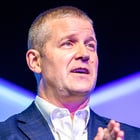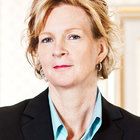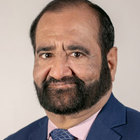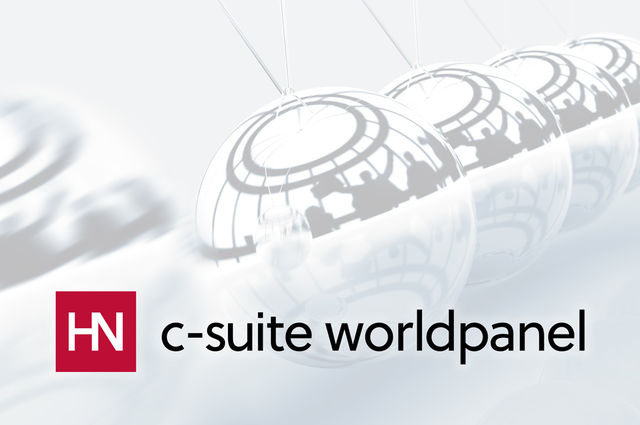A look back on 2020... Lessons learned
12 experts shared their view
Everyone agrees that 2020 has been the "annus horribilis" for the world and in particular the hotel industry. However, despite having to tackle unprecedented challenges, many companies grasped that the crisis also presented a unique opportunity to re-invent and re-imagine their business. In the long run, therefore, the pandemic may have some positive consequences as well as negative ones.
In response to the challenges of 2020, what is the single most important change that you implemented that you believe not only helped you get through the past year but that you also expect to maintain as part of your post-pandemic "new normal”?

This viewpoint is co-created with IDeaS a SAS company
More information
Extinction or Evolution? Three Hospitality Roles in Flux
We all know that our people are our greatest assets, at the center of everything we do, but never has that been clearer than through the pandemic. The closure of offices and hotels, temporary furloughs, and a general, pervading sense of uncertainty necessitated a re-evaluation of the ways in which we communicated with our Accor family. This was very real, very fast, and oftentimes, without supporting information, but communication was a lifeline during the pandemic, and I believe we are better for it.
Key lessons…
Frequency: The rapidly, constantly evolving situation required an escalation in the frequency of our communications, both to receive and share essential information. Weekly check-ins with our global CEO went daily; monthly in person Town Halls shifted into weekly virtual sessions; and our COVID-19 task force met daily, sometimes hourly. As a result, our teams received important information directly from us, and we were consistently informed and thus able to make critical decisions quickly and effectively.
Constancy: Amidst uncertainty, scheduling regular updates to key stakeholders on a daily, weekly, monthly basis – versus doing so ad hoc – maintained a sense of confidence, reliability and steadiness in what was otherwise an extremely volatile time.
Flexibility: When no longer able to rely on the pre-shift briefing or staff cafeteria, I've been impressed with the inventive ways in which our leaders have maintained regular communication with their teams. From private Facebook groups to WhatsApp chats, they've truly gone to where our employees are, and sustained not only a steady flow of information but also a vital sense of spirit and community.
Reciprocity: Facilitating two-way communication was critical, to have clear line of sight into how our stakeholders were managing through the crisis. We deployed new tools for listening and safe spaces for candid feedback, from anonymous surveys to varied chat options to one-on-ones.
Vulnerability: In crisis, the need for connection is stronger than ever, and we experienced firsthand the trust that can be built and strengthened through transparency, authenticity and vulnerability. When we didn't know, we said we didn't know. When things got really rough, we were candid about the impact COVID was having on our own personal lives. We brought everyone along on the journey with us.
I didn't anticipate it at the time, but transforming communication has built trust, instilled two-way voice, and strengthened our sense of family, allowing us to come out of this as a stronger, more effective team.
At The Student Hotel, we have remained open during the pandemic – albeit with fewer guests and restricted facilities. Because of our hybrid model and the flexibility this gives us, we can change the allocation of our rooms and re-designate hotel rooms to student accommodation. This has left us in a good place as things revert to a new normal. Even though it's been hard to work through lockdowns, our teams have done an amazing job to keep our guests happy, healthy, and safe and have continued to build a feeling of community, of connection, in every location.
We continue to offer a diverse (online) events programme including activities like mental wellbeing workshops, yoga sessions, Drag Queen Bingo nights, and e- learnings. At times, when COVID measures permitted, invites were extended to local neighbours to join in. That's why we still get great reviews from our guests and our NPS scores have been higher than ever.
Before the pandemic we were already focused on building a community vibe in our hotels. What we have taken from the pandemic is that we need to turn up the volume in making our spaces active and buzzy and places where it's just fun to hang out, also for neighbourhood locals. We are a place our community keeps coming back to; students come back as hotel guests, business travellers become co-working members and locals join our community events.
I believe that this community vibe and energy is going to be something that people really want to have and experience while they're travelling. I'd even say the pandemic has solidified us as more of a community platform than a hotel.
This was certainly the year I wish our industry never had to go through. Though personally, I believe living through September 11 in New York City was a scarier time, the COVID-19 pandemic had a far worse financial impact on our industry. At the time, I assumed the September 11 attacks were the worst event I would ever navigate through, but I was wrong.
We implemented a lot of changes to help us get through the pandemic, and most of them I hope we never have to do again! Like closing almost all our hotels, laying off 95% of our work force, cutting salaries as much as 50% for employees who were still working, negotiating payment plans with vendors who were owed money for goods delivered, and many other extreme measures to help us make it to the other side. Fortunately, we are starting to see some glimpses of that other side, and our plan to make it through a reality.
One area we really accelerated due to the pandemic was technology and innovation, specifically the introduction of contactless technologies and solutions on multiple fronts, including remote check-in, QR codes for restaurant menus, and, my all-time favourite, the introduction of Alfred the Robot at Dream Hollywood! The robot technology of delivering items to guest rooms really works and saves on labor expense. These are innovations we were eager to explore pre-pandemic, and they are all here to stay at Dream Hotel Group.
I think it's the pace and agility of how we responded that will be the lasting legacy of this period for everyone at IHG Hotels & Resorts.
As the pandemic struck, we faced a series of rapidly evolving extraordinary challenges across our markets. Sharing and applying learnings from teams across the globe, we reacted quickly and made fast decisions, keeping our owners and colleagues aligned and informed as we developed ways to support them. These included new cleanliness protocols throughout our nearly 6,000 hotels, as well as initiatives to reduce costs and maximise domestic market hotel revenue where possible. For our corporate teams, it was about adapting to suddenly working from home – both practically and emotionally – and using technology to ensure our pace never slowed and we were able to support our incredible hotel teams on the ground.
We saw just how important it is to prioritise, and deal with things quickly. We've been prepared to talk straight, learn, and focus our teams and operations to the evolving demands of each of our markets and hotels. Throughout we were clear that pace does not mean a lack of rigour, and that always acting in the interests of long-term reputation is essential. Perhaps more important than anything, with limited staff on hand, we learned the importance of ensuring our teams were clear on who has decision-making rights and when things may need to be escalated.
It has been such a hard time for so many but there's no doubt that the pace and pressure of this pandemic has brought some really important qualities to the fore at IHG and helped us evolve as people, teams and as a company. We're standing in the shoes of our guests and owners and really thinking like them; we're communicating more openly and working with greater speed and focus; and I think we've created a more invigorating environment that can be incredibly powerful and a lasting influence on us as the recovery continues and we push our business to its fullest potential. I am optimistic about our future as an industry .
Every serious crisis results in a true reset of our industry. The effects are often harsh and felt by all constituencies.
It also shows the true colors of an organization's commitment to its values. Priorities become clear again and those that stay on course with their purpose often do best.
Having said that, it is also a time of reflection as to the impact of the crisis on all constituencies. Taking a good 360 view allows you to see new opportunities and possibilities that come available.
Covid proved for sure that we love to travel, like meetings in-person best...but there is a serious alternative, which is cost-effective and a good substitute being the video call. Also digital became overnight a household use for all. Simple grocery shopping and retail, but also other industries that already showed successes online, shifted further or completely. It is this convenience and suggestive selling our hotel customers are getting used to.
So where does the hospitality industry stand in its digital journey? Many flashy solutions are being offered or promised, but often the legacy technology doesn't offer clean guest profiles, and as such no true profound impact is being served to the guest. In a way, no business process truly changes. Hotels do have to oblige rather sooner than later and come at par to other industries.
Also, sustainability showed not to be a marketing trend, but rather a true need. ESG (Environmental Social Governance) is the other main impact the hospitality industry can't ignore anymore. And no it is not just a gimmick or token certification that we have used some led light bulbs, rather it needs to become present throughout our organizations. Hoteliers often think that specializations like technology and ESG are just other knowledge points they need to add to their brought management skills, I believe without true professionals in these fields we won't make serious progress.
So never waste a good crisis still holds true, but look closely around you what the new requirements are.
The year 2020 will be remembered for the start of the pandemic and the global health crisis. But for those of us in the travel industry, 2020 had a dramatic effect on our livelihoods, as the world stopped travelling. Like all hotel companies, Global Hotel Alliance was massively affected when the world went into lockdown. Our DISCOVERY loyalty programme, which had grown successfully for a decade from 2010, saw a sudden 70% decrease in stay transactions. The one fortunate aspect of the timing for us was that we were already planning a significant investment into the re-launch of DISCOVERY. The pause in travel enabled us to conduct a lot of research and evaluate how the “new normal” would change the way our customers viewed travel and how that would change their perception of the value of their DISCOVERY membership.
The one message that stood out was that the notion of a loyalty programme as only providing value when you travel was rapidly losing appeal. Our customers wanted to be part of a programme that could recognise and reward them throughout the year. We discovered that on average - even pre-pandemic - our customers only travelled for 27 days a year, which left them 338 days of the year with a programme that offered little day-to-day value. And yet we found out that nearly half of our 17 million customers lived no more than a 30-minute drive away from one of our hotels, which was already a missed opportunity; but in 2020, that suddenly became the only way that our customers could engage with us!
So, in 2020, we created the concept of “Live Local”, which offers experiences and benefits for local customers who may not need to stay the night in one of our hotels but who can enjoy everything the properties have to offer - from beach clubs, golf, and luxury spas to an array of restaurants, bars, and entertainment. We launched this concept as a pilot with our local communities in Dubai and Bangkok last year, and after its initial success, our new “Live Local” concept will form part of our completely rethought loyalty offering when we launch “DISCOVERY 2.0” later this year in October.
As hoteliers, it is always important to take the pulse of consumer behaviour and understand how our customers react to events and evolving trends. Yet 2020 gave us a unique opportunity to do this while everything we thought we knew about travel was being disrupted. Having used the 2020 “downtime” to listen to our customers and, importantly, to continue innovating and investing in our products and services, we are confident that we will have a more engaged customer base when the long-awaited recovery finally comes.
The 2020 New Normal required a serious rethink of the hospitality space, which we accelerated by applying our DNA features: resilience, agility, and strife for innovation through impactful partnerships and transformative brand collaborations that address the needs of the evolving marketplace by curating personalized experiences and create community-centric lifestyle destinations. Our focus on Reimaging hospitality spaces and portfolios has proven to be a hospitality win-win survival approach in the toughest year for the world's economies and humanity. What transpired is that the propositions we have been addressing for five years proved to be the right formula. Here it is: address the changing habits of how people live/work and socialize and how developers can utilize space and essentially own high-performing assets that are adaptable to evolving hospitality scenarios and remain future-proof. The lessons learned are straightforward: foster the local supply chain, create experiences for the community by building a Purposeful project with a Visionary owner.
Today, all of us understand what takes people to stay well and that is why, more than we have previously done, we focus on delivering holistic wellbeing helping our tenants to adjust and embrace a healthier lifestyle that inspires them to reach their fitness goals. That is why lobbies, in mixed-use developments, have turned into holistic wellness centers with power food options and yoga spaces, that are connected to the local communities encouraging a more fitness-oriented lifestyle by partnering with the neighborhoods.
The time previously spent shuttling countries, was last year redirected to collaborations with impactful initiatives that empower women in the industry and the next generation of hoteliers, enhance the sustainability agenda and focus on ESG investments that make a difference, in the industry while helping address the whole Ecosystem through innovation and strategic global outcome-driven partnerships. As a result, Kerten Hospitality has collaborated with Women in Hospitality Global – a best-in-class community for the empowerment of women in hospitality and the Sustainable Hospitality Challenge involving 30 Top Tier hospitality schools from around the world. We have also focused on mission-critical public-private initiatives that upskill hospitality students' skillsets and prepare them to enter the workforce. We have also partnered with the world's largest body on responsible investment backed by the UN. Contributing to the global sustainability agenda and ESG vs CSR, by committing to programs that can really change the world and not just talk about plastic straws, demonstrated what the New Now needs: ACTION over WORDS!
Exactly this mindset has helped us turn global projects into hospitality and lifestyle hubs and go-to destinations. With flexibility, extra effort, and “smart approaches”, Kerten Hospitality has collectively gone through this and has also shown a real sense of resilience and adaptability whilst staying on track. Ahead of our multiple openings this year, we believe that this is the Road to Recovery, more learning, and greater hospitality.
I joined Deutsche Hospitality in November 2020 as CEO after having been with the Steigenberger group already between 2004 and 2010. Despite the challenging corona phase, it feels great to be part of the #DHfamily and I am very happy to have returned to the hospitality industry on which I have always kept an eye during my times at Europcar and Gulf Air.
The corona pandemic has obviously presented the entire industry with unforeseen challenges. For Deutsche Hospitality, the “new normal” will be a way forward which will see us grow to become one of the top 3 European hotel companies within the next years. We have taken the pandemic as an opportunity to reshape our company to be ready for this growth. We have started this reorganization in our commercial and brand structures, for example. The new brand structure is divided into segments instead of brands: Luxury, Upscale, Midscale, and Economy. This will make it much easier to implement new acquisitions into these segments.
On another level, we have implemented new concepts for remote work and hybrid events. This trend was accelerated by the pandemic and we are now offering hybrid meeting suites, broadcast studios and digital meeting platforms ranging from spontaneous meetings to virtual trade fairs. We will also be launching an all-in package of services for conference breaks and additional options such as cookery courses, yoga lessons or DJ sets during which participants mix cocktails together. The combination of virtual and face-to-face events will be part of our “new normal” business culture.
The pandemic has indeed thrown the global economy a curve ball, with an estimated -3.5% growth as projected by International Monetary Fund*. Industries such as travel and aviation have taken the largest hit as the skies closed, and now it seemed for a longer period than expected.
At Pan Pacific Hotels Group, we implemented various strategies swiftly, driven by internal customers for greater efficiency and productivity and also by the external customers due to evolving needs and habits.
We recognise that overall, there is a heightened concern about hygiene and safety, with less desire for human contact. The world is also getting more digital savvy, becoming dependent more and more on online sources and faster turnaround.
Hence, we focused on digitisation and innovation efforts immediately. We set up strong and scalable e-Commerce platforms. These include providing a channel for online F&B orders and delivery, a brand APP for direct mobile access to reservations and status checking, and strengthening our customer relationship management to better capture consumer behaviour and targeted marketing. Beyond that, we expanded on our weChat powerhouse with mini-programme, weChat store and booking capabilities to target the China market effectively.
We also rethink sales and marketing tools, channels and programmes. While sales efforts are hindered with limited onsite inspections, we launched virtual video tours, virtual wedding shows and also live streams with partners to engage our customers. Additionally, we were quick to roll out EzyMeet, our virtual and hybrid meetings offerings which enabled our clients to hold meetings with a peace of mind as coffee breaks and all logistic needs taken care of by us.
It is said that COVID is the best accelerator for digital. I am inclined to agree with this. The situation has indeed pushed us forward to work with unprecedented timelines, but with no compromise on quality and standards to continue to meet the evolving needs of our guests.
*https://www.imf.org/en/Publications/WEO/Issues/2021/01/26/2021-world-economic-outlook-update
2020 has indeed been a difficult year but it has also given us the opportunity to review and ensure we had all the measures in place to support a swift business recovery.
Throughout the pandemic, we have remained committed to our strategic five year plan which we established in 2017 with 25 concrete objectives, and the objective to be perceived as one of the top three hotel brands in the world and the brand of choice for owners, guests, and talent. This in-depth process during the past years makes Radisson Hotel Group a truly transformed company, ready for the rebound of tourism & travel.
Some of these fundamental optinizations and transformations include the investments in IT and systems focusing on building best-in-class revenue systems and a strong future-proof IT backbone called EMMA.
In reaction to the pandemic, we have accelerated the roll out of selected programs, such as EMMA, as well as introduced new solutions in an agile response to the new market conditions.
This is shown in the launch of our Hybrid Rooms and Hybrid Meetings, building on our continued investment in digital solutions and the ZOOM partnership in select locations across EMEA. We believe hybrid is here to stay – allowing for a powerful and seamless combination of face-to-face meetings in multiple locations.
We welcome meeting attendees and guests in a safe environment thanks to the global application of the Radisson Hotels Safety Protocol, in partnership with the worldwide leader in certifications SGS, and our support of the WTTC's Safe Travels Guidelines – both in place since May 2020. Earlier this year, we launched a new comprehensive testing program, and we are proud to be the first hotel group to roll out a rapid testing service for meeting and event attendees at properties across our EMEA portfolio.
In terms of the growth of our portfolio, we have seen robust success in key segments such Serviced Apartments which have proven to be a resilient business model. We have set a target to more than double serviced apartments portfolio within the next 5 years. To respond to investor opportunities in conversions and increased interest from existing hotels to join our global network, we launched Radisson Individuals in 2020. Just 6 months after its launch, we signed and opened properties in the UK, Austria, Estonia, Bulgaria, Serbia, the US and India.
As a global organization, all IDeaS' offices have been impacted in different ways at different times since the beginning of 2020. Our team members in China were at ground zero, and now, over a year later, our staff in India is facing their most trying period. Through all the hardships, we've supported one another as well as our clients in the hospitality industry. I am extremely proud of how IDeaS pivoted to working remotely and shifted many of our core focus areas while still maintaining exemplary levels of support and productivity.
What used to seem stable has now become increasingly volatile. While we have more data than ever, we are also more uncertain about the future than ever. We cannot rely on the past as an indicator of the future. In a world where everything changes faster than ever, is more uncertain than ever, and more complex, we need new and innovative ways to cope with the volatility, uncertainty, complexity, and ambiguity in the environment. That is precisely what IDeaS had to do to ensure we are on track to become stronger than ever.
We quickly realized we would need to adjust how we work and how our clients work with our solutions. Knowing we could no longer depend on historical data to predict the future, we recalibrated our systems to react faster to produce appropriate controls during the disruption and observe and respond as business begins to recover. We recognized the power of proactive analytics to provide a compass our clients could count on to help navigate this crisis. And we saw how intelligent automation could help hotel teams do more with less and keep their businesses afloat.
This terrible pandemic has taught us all—both IDeaS and our clients—how to live with uncertainty. We're no longer afraid of the unknown because our resilience has been tested, and we are now more adaptable and agile than ever before. We've learned how to weather this storm and will be all the stronger and smarter for it when the next storm comes along.
While IDeaS has always had a close relationship with its 15,000+ global clients, the pandemic has forced us to align ourselves even closer with the hotels we support. In the initial stages, as demand evaporated and hotels closed, we needed to make the necessary changes to our revenue management and pricing systems to deal with the constantly evolving situation. Then we had to “teach” the system about all the changes that had taken place in the various markets and across hotel types.
To take into account the surge in demand for accurate and timely data, we re-prioritized our development roadmap, launching a COVID recovery dashboard for our clients, enhanced our budgeting and forecasting system, RevPlan, and developed a new hotel and enterprise multi-property reporting solution, Optix. Rather than cutting costs and reducing headcount, we doubled down, made a commitment not to lay off a single person for economic or pandemic related reasons, and significantly increased spending in client support and product development.
Our new hybrid client support infrastructure and enhanced tools are already proving to be much appreciated by the industry and will continue to serve our clients as the effects of the pandemic recede.













